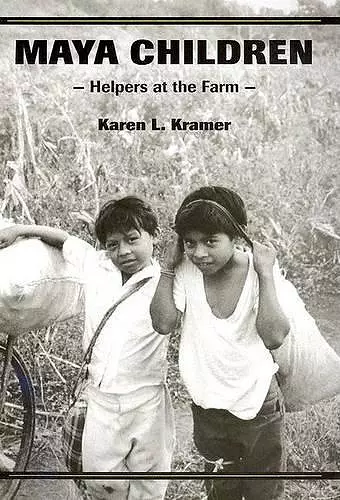Maya Children
Helpers at the Farm
Format:Hardback
Publisher:Harvard University Press
Published:30th Jun '05
Currently unavailable, and unfortunately no date known when it will be back

This is an original and important contribution to the cultural anthropological field of sociodemography and family studies. Overall it gives us a critical addition to demographic transition studies by providing an explanatory framework for the maintenance of high fertility in a subsistence agricultural context . In Karen Kramer's hands life history theory provides a powerful critique of standard wealth flow theory. Just as important, her methods of measuring child productivity set a new standard and probably invalidate or at least call into question traditional measures of net child productivity. -- Raymond Hames, University of Nebraska-Lincoln The empirical contribution of this book is very solid. Karen Kramer contributes a dataset regarding children's work and their place in family systems to the few that have been published. The detail of her study in terms of time allocation, production, and consumption is exemplary and will be avidly received by scholars of childhood. Not only are her methods of data collection and analysis very sound, but the qualitative component of her data collection provides context that is often missing in studies rooted in the theoretical perspectives utilized here. -- John Bock, California State University, Fullerton
Among the Maya of Xculoc, an isolated farming village in the lowland forests of the Yucatán peninsula, children contribute to household production in considerable ways. Thus this village, the subject of anthropologist Kramer's study, affords a remarkable opportunity for understanding the economics of childhood in a pre-modern agricultural setting.
Among the Maya of Xculoc, an isolated farming village in the lowland forests of the Yucatán peninsula, children contribute to household production in considerable ways. Thus this village, the subject of anthropologist Karen Kramer's study, affords a remarkable opportunity for understanding the economics of childhood in a pre-modern agricultural setting.
Drawing on a range of theoretical perspectives and extensive data gathered over many years, Kramer interprets the form, value, and consequences of children's labor in this maize-based culture. She looks directly at family size and birth spacing as they figure in the economics of families; and she considers the timing of children's economic contributions and their role in underwriting the cost of large families. Kramer's findings--in particular, that the children of Xculoc begin to produce more than they consume long before they marry and leave home--have a number of interesting implications for the study of family reproductive decisions and parent-offspring conflict, and for debates within anthropology over children's contributions in hunter/gatherer versus agricultural societies.
With its theoretical breadth, and its detail on crop yields, reproductive histories, diet, work scheduling, and agricultural production, this book sets a new standard for measuring and interpreting child productivity in a subsistence farming community.
This is an original and important contribution to the cultural anthropological field of sociodemography and family studies. Overall it gives us a critical addition to demographic transition studies by providing an explanatory framework for the maintenance of high fertility in a subsistence agricultural context . In Karen Kramer's hands life history theory provides a powerful critique of standard wealth flow theory. Just as important, her methods of measuring child productivity set a new standard and probably invalidate or at least call into question traditional measures of net child productivity. -- Raymond Hames, University of Nebraska-Lincoln
The empirical contribution of this book is very solid. Karen Kramer contributes a dataset regarding children's work and their place in family systems to the few that have been published. The detail of her study in terms of time allocation, production, and consumption is exemplary and will be avidly received by scholars of childhood. Not only are her methods of data collection and analysis very sound, but the qualitative component of her data collection provides context that is often missing in studies rooted in the theoretical perspectives utilized here. -- John Bock, California State University, Fullerton
Parents in industrialized settings hardly need to be told how economically irrational having children can be. But Maya Children: Helpers at the Farm suggests that large families may not make sense even in societies engaged in subsistence agriculture, except for one significant factor. Children help parents, and particularly mothers, deal with the multiple challenges associated with raising multiple dependents simultaneously during the uniquely lengthy period of human parental support, ranging up to two decades...Kramer's study is an admirable effort to both measure and assess children's help. While any such measures are imprecise, the conclusions drawn seem both reasonable and worthy of further replication. Methodologically and theoretically, it suggests that while children's activities may be hard to record, or even invisible, their mercurial nature hardly connotes insignificance. -- James Loucky * American Journal of Human Biology *
ISBN: 9780674016903
Dimensions: unknown
Weight: unknown
272 pages